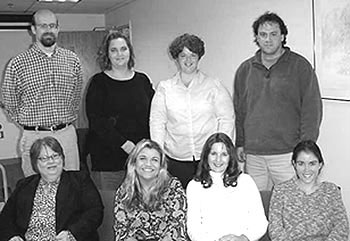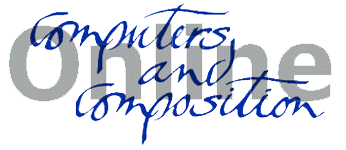Fall 2003/Spring 2004 - Editor's Welcome
Welcome to the Fall 2003/Spring 2004 issues of Computers and Composition Online, a celebration of the 20th Anniversary of the print version of Computers and Composition: An International Journal. Both the print and electronic version of the journal have undergone a number of changes over the years, but what is constant is the emphasis on making the journal a working space for new and established voices to theorize and apply the role of new and emerging media and digital tools upon the teaching of writing, in ways that lead to innovative pedagogy and complex theory-building about the shifting paradigms of literacy. Our Fall 2003 and Spring 2004 issues are no different. Theory into Practice features Anthony Ellerston and Margaret Graham's "In the Cyberhood: Using Global Technologies for Local Purposes," examines implications of materials changes in Internet technologies available to educators and the powerful role applications such as Macromedia Flash can play in the first-year writing program.
Our current issue includes Michael Cripp's "#FFFFFF, #000000, & #808080: Hypertext Theory and WebDev in the Composition Classroom," an exploration of what it means to teach students to compose in hypermedia environments, and Kara Poe Alexander's innovative video "Literacy Practices and Literacy Events of a 21st Century American Child," a case study of the range of texts, contexts, and technologies that impact early literacy acquisition. Complementing these pieces is Ellen Cushman's multimedia composition "Toward a Rhetoric of New Media: Composing (me)dia," a theoretically and technologically rich blend of cultural, postmodern, and multimedia rhetorics.
In the Virtual Classroom section, our Fall 2003 section features Michael Kapper's "Mixing Media: Textual, Oral, and Visual Literacies (and then some) in Teaching PowerPoint," a discussion of the multiple literacies that emerge when teaching multimodal presentation software, and Lauren Yena and Zachary Waggoner question the role of online collaboration in fostering productive disagreement, using student feedback and online intereactions from two online writing courses in "One Size Fits All?: Student Perspectives on Face-to-Face and Online Writing Pedagogies." Similarly, in our Spring 2004 features, Lennie Irvin's "Reflection in the Electronic Writing Classroom," addresses the potential of electronic pedagogies and more public audiences to foster such student self-reflection. Finally for Spring 2004, Laurie Taylor and Brendan Riley's timely "Open Source and Academia" explores the potential of shared standards and common use to provide new spaces for collaborative knowledge making pedagogies.
The value of such contributions is not only in their ability to foster further awareness of the need for more research and experimentation in electronic writing environments, but also in their ability to do so in a web-based format, adding to the growing body of digital scholarship in our field. An important contribution to this conversation in our 2003 Professional Development section includes our Bowling Green colleague Jude Edminster and her innovative work on electronic theses and dissertations, including her white paper "Resistance to ETDs in Academe: Diffusion of Innovation," as well as a link to her own electronic dissertation, an audio interview, and a range of resources about the history and best practices of ETD theory and application. And Christine Tulley's 2004 Advanced Web Writing Class review of James Gee's recent book on video games and literacy suggests, technology plays an significant role in the professional development of undergraduate writers as they learn to collaborate virtually and reflect on the process in a chat session.
In addition to ou 2003/2004 Reviews section with Steve Krause's review of Todd Oppenheimer's The Flickering Mind: The False Promise of Technology in the Classroom, Joe Wilferth's review of the recent award winner Teaching Writing with Computers: An Introduction and Paul Cesarini's review of the OpenCD, Print to Screen features a series of position statements about the role Computers and Composition has played in the professional lives of some of its current and former editors, including Cindy Selfe and Gail Hawisher, Kate Kiefer, and 20th anniversary guest editors Danielle DeVoss and Heidi McKee. Finally, a special Print to Screen feature for 2004 includes Barclay Barrios's "Grading the writing program web site: Assessing some assessments," a companion piece to his print article in the double anniversary issue of Computers and Composition.
 Ultimately, what makes these issues reflective of the communal nature of the computers and composition community is the ability to welcome and support new and existing voices in the field and to work together to produce new perspectives in new formats about the continuing impact of technology on the teaching of writing. Some new additions to the journal include our blog, which we hope you will contribute to, and we hope you will also consider sending us your work and your calls for papers as we continue to establish our virtual presence here in Bowling Green.
Ultimately, what makes these issues reflective of the communal nature of the computers and composition community is the ability to welcome and support new and existing voices in the field and to work together to produce new perspectives in new formats about the continuing impact of technology on the teaching of writing. Some new additions to the journal include our blog, which we hope you will contribute to, and we hope you will also consider sending us your work and your calls for papers as we continue to establish our virtual presence here in Bowling Green.
Standing: Richard Colby, Amie Wolf, Elizabeth Monske, Christopher Harris
Seated: Lanette Cadle, Kris Blair, Cheryl Hoy, Rebekah Shultz


